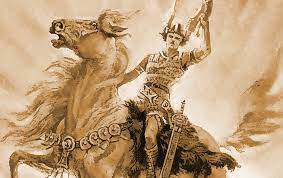Heimdall was a god in Norse mythology who was known for his sharp senses and his role as the guardian of the Bifrost Bridge, the rainbow bridge that connected Asgard and Midgard. He was often depicted as a watchman, keeping a constant vigil for any threats to the gods or the realms.
According to mythology, Heimdall was born from nine mothers who were all sisters. He had incredible senses, able to see and hear for miles around. He was also known for his sharp sword and his horn, which he would use to alert the gods of any impending danger.
In addition to his role as a watchman, Heimdall was also associated with the sea and with ships. He was said to have sailed on a ship called the Naglfar, which was made from the nails of dead men.
Heimdall's significance in Norse mythology lies in his role as a protector and a watchman. He embodied the values of vigilance, watchfulness, and protection, which were highly valued in Norse culture.
Heimdall can also be interpreted as a symbol of the connection between the realms. The Bifrost Bridge represented the link between the mortal world and the realm of the gods, and Heimdall's role as its guardian emphasized the importance of this connection.
Overall, Heimdall was a significant figure in Norse mythology, representing the values of protection and watchfulness. His role as the guardian of the Bifrost Bridge emphasized the interconnectedness of all things in the Norse universe.
Works Cited:
Larrington, Carolyne. The Poetic Edda. Oxford University Press, 2014.








